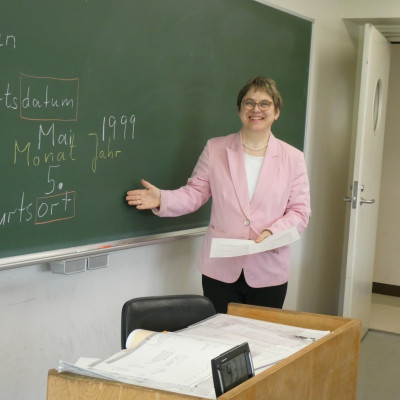Sessions / Zoom C

CEFR–Talk – A CEFR & LP SIG Special PanSIG Online Forum #188
This Forum is an open CEFR – Talk. CEFR & LP SIG members and anyone who is interested in the CEFR, the CEFR/CV and related topics are kindly invited to this lunchtime talk on the CEFR. There are various topics to share: First is the new research project (Kaken) on “Language Education reform using action research: Consulting the CEFRs educational principles” 「アクションリサーチの手法を用いた言語教育改善: CEFRの教育理念を参考にして」. We are looking for people getting involved using the CEFR and doing action research. Second, the recent development in remote emergency teaching could be an incentive to do research on online teaching and the CEFR & CEFR/CV, discussing and adapting for example related ‘Can Do’ descriptors. Third, other fields were CEFR & CLIL (conference in October), CEFR & tasks for teaching/assessment, CEFR & mediation, ... As format for the forum this could be a general talk (all) or with breakout sessions (thematically). The new normal opens up different pathways. Looking forward meeting people interested in the CEFR! You are welcome!

Mending Inadequacies of 2FL Textbooks in Japan #189
Despite manifold advances in foreign language teaching materials, textbooks often lag behind and teach inappropriate language or use outdated approaches. This presentation is an attempt at a simple systematization of some of these issues. The audience is made aware of the differences and provided with methods for reducing them. This presentation takes beginners’ courses of German as an example and compares relevant parts of recent Japanese-German textbooks with corresponding parts in the presenter’s approach. The following issues will be addressed: - Limits of literal repetition of sentence parts, - Excessive/superfluous explicitness in German, - Lack of variations where these are preferred, - Sacrificing the target language for teaching traditions and learner convenience, - Lacking linguistic analysis leading to (at best) funny and ironic scenes, and - Overemphasis on grammar where simplicity would serve the learners. Solutions to the issues addressed will be proposed from the presenter’s approach and the audience will be encouraged to look for their own solutions to related issues.


Leading the L3-learners beyond the textbook #152
Rudolf Reinelt, Ehime University Since 30+ years ago, Japanese university students have reported an increase in their English speaking abilities when taking the presenter’s German beginners’ courses. This “vitalizing” of previously learned foreign language parts was usually reported after several classes with the presenter’s approach based on learner activation with students speaking in class, practice with partners, class practice (not new!), practice fast in short time, and practice with different partners. Searching for research methods to prove the phenomenon and more reliable evidence than the spontaneous and hard to control narratives, the presenter administered a questionnaire at the end of the 2019 second term and asked the learners if and how learning a language other than English influenced or even led to improvement in their English abilities.
Bertlinde Voegel, Osaka University The presenter noticed that the students were willing to memorize phrases for dialogues, but they were rather hesitant to apply them in new contexts. In order to enable the students to gain confidence when forming sentences, the presenter asked the students to write texts, for instance about the field trip in High School. German textbooks for adults for the international market don´t cover the topic of trips to Asian destinations and the expressions for describing the fun and joy of being with friends away from home. What experiences are they actually making? An analysis of the texts and suggestions for useful phrases in German will be given.



Learning about teaching through foreign language learning #167
What is the impact of learning a foreign language on EFL teachers? This presentation looks at the advantages and difficulties of EFL teachers learning beginner-level French as a foreign language (FFL). The class was offered to EFL teachers at the same university as a professional development opportunity, and was held twice a week for two semesters. The presenters are the teacher, one of the students, and the class administrator. They examine the results of student questionnaires and interviews which highlight the successes and challenges the students reported from learning FFL. The results indicate that the time commitments are the biggest impediment, while the benefits include French language learning, team bonding and insights into how it is to be a language student. Based on these benefits, the class administrator presents foreign language learning as an approach to EFL teacher development. By exploring the impact of EFL teachers learning FFL, this presentation contributes to the discussion on beliefs about learning, student empathy and faculty development.


Mindfulness: Making the Most of Class Time #169
While what we do as teachers is undeniably important, how we do it might be equally important. Keeping focus when a student is disruptive, knowing when to end an activity, and motivating students all take skill. While experience and knowledge of pedagogy can make situations easier to manage, teachers can also benefit by staying in the moment with a heightened sense of awareness. A mindfulness practice can help a teacher achieve a greater level of awareness and improved decision making on class day.
At the same time, there are things we can do to encourage our students to be mindful. Research indicates, for example, that subtle changes in the way teachers give instructions could make students more mindful. Moreover, some schools are introducing mindfulness meditation training for students. Japanese professors based in Hikone have instituted a U.K.-based mindfulness program here in Japan. The “mbsr study group” conducts research and offers mindfulness workshops for teachers in Tokyo and Kansai with an aim to introduce mindfulness in Japan's public schools.
This presentation identifies several approaches to cultivate mindfulness in education and provides brief descriptions of their efficacy. Journal entries written by teachers involved in mindfulness meditation will be shared.